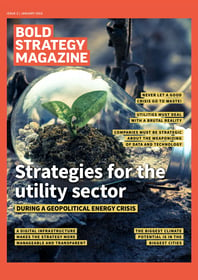"Never let a good financial crisis go to waste!"
.png)
During the Covid pandemic, some companies went under while others delivered exceptional results. This prompted the non-profit Brightline Initiative to research the phenomenon to understand what happens during crises, what successful organizations do, and what new lessons we can take away. According to Tahirou Assane, it's all about focus, speed, people, and communication.
At the conference on supply strategies, the director of the Brightline Initiative, Tahirou Assane, was featured on a video link. Brightline is a non-profit organization whose aim is to bridge the gap between strategy design and strategy execution by researching the field and making detailed knowledge available to businesses and organizations.
According to Tahirou Assane, failed strategic plans and poor implementation mean that in the US and Europe alone, an amount equivalent to all the Nordic countries' annual GDP combined is lost each year. He explained that such unbridled financial waste must not be allowed to continue and is the very reason for Brightline's existence. In his presentation, Tahirou Assane focused on crisis situations and how people act when faced with one. Although no one wants a financial crisis or any other crisis, according to Assane it is a circumstance that can provide tremendous lessons.
Extraordinary results during the Covid pandemic
He believes companies can learn to become more effective in their strategy execution by studying what the most successful companies do. They also need to understand why some companies fail and do not achieve their goals, which is particularly important during a financial crisis.
"During the Covid pandemic, something happened that made some companies not only survive and withstand the crisis but actually deliver extraordinary results. This prompted us to conduct a study to understand what happens during crises, what successful organizations do, and what new lessons we can take away," says Tahirou Assane.
Although we have hopefully weathered the worst of Covid, the pandemic is very much still with us, Assane says, pointing out that we also face many other concrete and current crises that need to be addressed.
How can the 'magic' of crises become more permanent?
"The world faced a challenge with Covid and right now we are moving towards a state where we go from crisis to crisis; we have energy challenges, supply chain challenges, economic difficulties, and more. So it's interesting to look at what characterizes a financial crisis."
He describes a financial crisis as an event that, if not handled appropriately or at all, becomes a disaster. Assuming that this is the definition of a crisis, how can a company transform itself through the experience of going through a crisis?
"In one survey, there was a particular question that kept coming up: Why does it take a crisis to create such concentrated and effective collaboration, such good communication, and engagement in an organization as we see here? Why isn't this something we just see every day? And how can at least some of this 'magic' we see during crises become a more permanent element or 'business as usual'? These are some thought-provoking questions," says Tahirou Assane.
Culture is the crucial bulwark in a financial crisis
It is often said that the best in people comes out in heightened situations and times of crisis and disaster, but Assane rhetorically asks if we really need these massive moments of stress and upheaval to confess our colors as people or as a company.
"Why can't we just learn from crises and use the learning we see in crises as an everyday way to move our organization?" Tahirou says. "I believe that culture is the crucial bulwark in resisting a financial crisis. It is also the culture that helps turn a crisis into an opportunity, even if the culture change is initially born out of fear."
In a crisis we cannot operate as normal
A good practice is not necessarily limited to one sector or geographical area, so Brightline surveyed a range of organizations globally, including non-profits, public authorities, and the private sector. As many as 93% of respondents explained that they change standard operating procedures when faced with a crisis. But what does this mean in practice? That question intrigued Tahirou Assane.
"When we go through a crisis, we cannot continue to operate as we normally do. We must be willing to make difficult decisions, make changes and adapt to deliver effective results. When we reviewed the survey responses, there were four key insights; the first was about focus, the second was about speed, the third was about people and the fourth was about communication," he explains.
FOCUS - prioritize what really matters
"What we can observe during a crisis is focused attention. People are no longer divided, there is a sense of danger and a consequent sense of urgency. That's why you can't stand still. You must move, act, and do something, to take the pressure off, to avoid being distracted and diverted from the problem at hand so that you can focus directly on what matters. It's about solving the challenge in front of us by responding in a way that helps our organization to survive. This is the core focus," explains Tahirou Assane.
In Brightline's survey, 75% of respondents said they became stronger as an organization as they went through the crisis. 91% reported making priority changes to gain the agility needed to adapt to what they were up against.
Assane recalls the energy crisis of 1973 when Denmark took a bold decision to cut energy consumption and think of alternatives to become less dependent on oil, which was ahead of its time at the time.
"When we went through this crisis 50 years ago, companies and governments had to be brave and focus on what really mattered. They weren't necessarily popular decisions, but courage was a prerequisite for tackling the challenges. The government should perhaps rethink what went right during the previous energy crisis," says Tahirou Assane.
SPEED - decide, observe, learn from mistakes and adapt quickly
Speed is another crucial aspect. Usually, people will feel that they have enough time, that things can wait, and that they can decide tomorrow or next week. But during a crisis, there is just no time. Conditions are unpredictable and decisions must be made on a limited basis of information. This means that you must also be able to listen and look at the results that come out of the decisions and be willing to correct and adapt to change quickly.
"Covid is still in most people's memory and therefore an ideal reference point. If you look at the time, we went through the Covid crisis, the government had to adjust course many times because we were not in a perfect situation - from the early arguments about the need for masks to the development and spread of vaccines and the subsequent claims of dangerous side effects. The government, and governments globally, were constantly adapting, not just daily, but hourly. They acted quickly, learned, and adapted to emerge from the crisis in one piece."
"In the current energy crisis, some of the decisions we take will take a long time to implement, but we actually need to act quickly," says Tahirou Assane. In the survey, 91% of respondents said the crisis was speeding up their decision-making processes.
PEOPLE - bringing talent and potential to the fore
For Assane, empowering people on the front line to act in a way that helps the organization move forward is a core issue. They need to be empowered and mandated to unlock their potential and be effective in a crisis. Organizations that can harness their talents across the board are also more successful in a crisis situation, and many organizations actually believe that the crisis allows talents to come to the fore. It also opens the possibility of changing structures in a way that the benefits of learning remain intact after the crisis.
"Governments and authorities sometimes act as if they have to take problems out of the hands of ordinary people and hand them over to elected representatives and the administration," says Tahirou Assane. "But citizens are often the ones who can best see the challenge and understand the consequences. That's why they should be more involved, so they can rally around the challenge and show a willingness to accept the sacrifices we sometimes have to make to get through a crisis and come out the other side stronger."
A utility does not just build new capacity or change supply structures overnight. So, while you're doing that, you can address the problem of consumption, and that's where the general public can come in and play a role. It is about common interests, being on the same side, and going in the same direction.
COMMUNICATION - be open and honest and build trust
Where some say location, location, location, Assane says communication, communication, communication. Because when it comes to working with stakeholders and collaborating across an organization, inclusion is key. In most crises, you need help from all stakeholders and all parts of the organization, and only with clear communication can you break down barriers and make things happen.
Looking at the current energy crisis, Tahirou Assane says it's a false assumption that it will be handled mainly by energy producers. The government must be involved. Municipalities must be involved. Citizens must be involved. And the way to bring all these together as a coalition is through open and honest communication.
"Transparency in communication is key because it builds trust. We need to be honest about where we are, what challenges we face, what we might need to do to address the challenges, and what we need to do to move forward. But also, what we might not succeed at," says Assane.
Sharing positive and sometimes not-so-positive messages shows authenticity and build trust, which can be used to build support and find a way forward. In the Brightline survey, 71% agreed that a clearer understanding of priorities provided a better sense of direction. People talked and communicated with each other, and information was shared with everyone.
Resilience must be built before a crisis
"The challenges being talked about create a collective sense that people know what's important to move the organization forward. That's very much something we need today. Just take the two pipelines that were blown up in the Baltic Sea. When the government communicates clearly: this is what it can mean. This is what we are doing to solve the problem. This is what we can achieve. And this is what we may not achieve. That kind of transparency gives people the opportunity and the will to help push through an important agenda," explains Tahirou Assane.
Assane admits that it's true that the best time to prepare and build resilience in an organization is before you face a crisis. While working at the UN, he had a discussion with a former colleague who talked about the reputation of the organization and argued that it is something you create in good times. That the covenant you build benefits the organization and becomes a shield when there is a crisis or a risk of reputational damage.
"It's obviously good to start before a crisis hits, so we're prepared when and if it happens and can be a more resilient and adaptable organization. But it is also important that we work to ensure that we as organizations take advantage of the learning we get during a crisis and are able to apply it," says Tahirou Assane, emphasizing his point: "That is why we should never let a good crisis go to waste!"
In Chinese the same character is used for ‘crisis’ and ‘opportunity’, and this underlines the point that Tahirou Assane was making throughout his presentation. Learn everything there is to learn from events like Covid lockdowns and financial crisis and take those learnings into future actions and strategies. Problem solving, invention and character can go into overdrive when crisis strikes and the going is at its toughest. As Tahirou points out, a crisis does not have to become a disaster if action is taken promptly and appropriately and the experience becomes part of the company’s forward journey. By definition a crisis is outside of ‘the normal’; difficult decisions have to be made, changes have to be made and company culture is the solid foundation on which survival and, ultimately, progress are built.
In November 2022, a conference on how the energy crisis and utility strategies are now one of the biggest challenges for all companies, was held at the Danish Parliament. To get all valuable insights from this conference, feel free to download the Magazine with everything that you need.



.png?width=596&name=Strategy%20Development%20(1).png)


.png?width=596&name=Digital%20Infrastructure%20(1).png)



.png?width=80&name=USED%20(1).png)